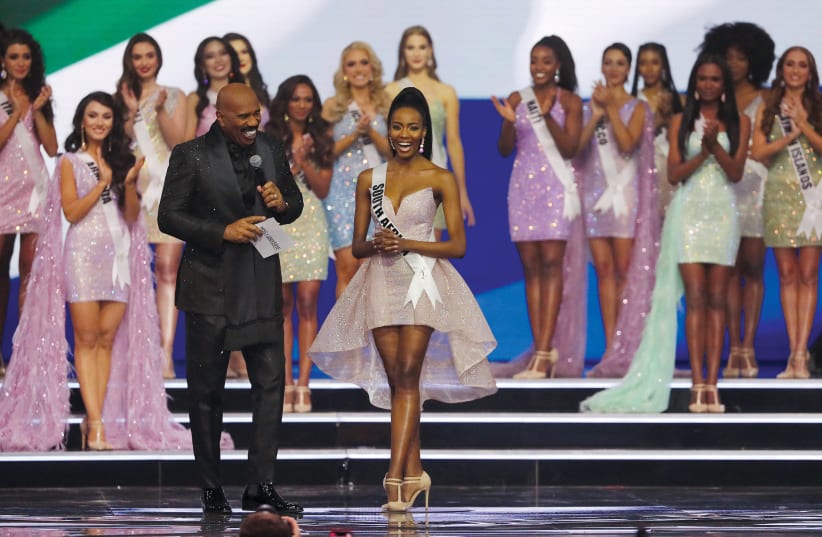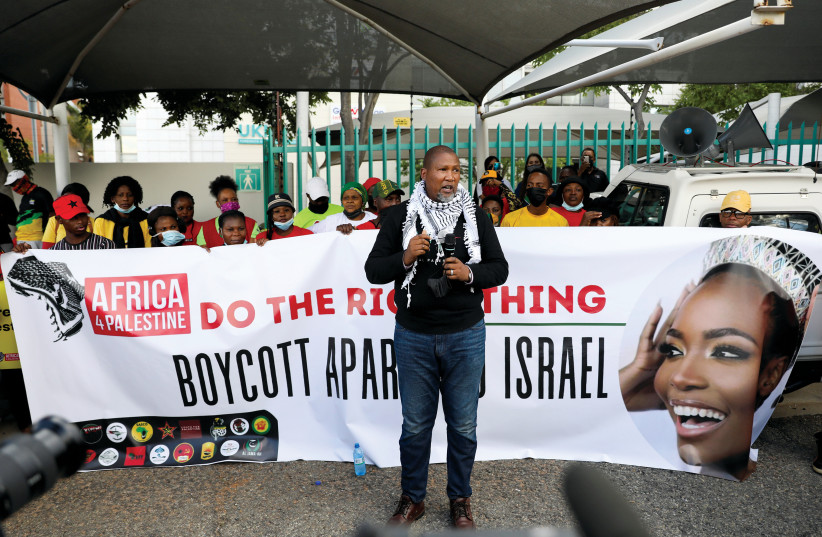South Africa, in recent years, has become a stronghold for the BDS (Boycott, Divestment and Sanctions) movement with a legion of local activists quick to condemn Israel. So it was hardly surprising that BDS activists protested against last month’s Miss Universe 2021 pageant being held in Eilat.
The drama started with a statement issued by the country’s Department of Sports, Art and Culture announcing it would no longer support the Miss South Africa pageant because its organizers insisted on sending the 24-year-old winner, Lalela Mswane, to Israel to compete on the international stage.
As “the legitimate representative of the people of South Africa,” the Department said, it “could not in good conscience associate itself with the atrocities committed by Israel against Palestinians.”
The war cry was led by the grandson of late South African president Nelson Mandela. Zwelivelile “Mandla” Mandela didn’t shy away from using apartheid rhetoric that resonates with most South Africans.
“There is nothing beautiful about occupation, brutality and institutionalized discrimination against the Palestinian people,” he declared on social media.
The current age of keyboard anarchy meant that vile remarks littered the comment sections on Facebook, and shots were fired in the Twitterverse with the hashtag #NotMyMissSA.
Users argued back and forth on whether a young woman had the right to fulfill a dream she has held since a little girl. Zev Krengel, national vice-president of the South African Jewish Board of Deputies, lambasted the anti-Israel lobby for its bullying and intimidation, and said Miss SA was being used as a political scapegoat.
“Miss SA is a young woman, she is an easy target,” he said.
The furor left Mswane disheartened. She confesses that her mental health declined because of the “personal attacks from people who don’t know me from a bar of soap. I’ve been called things I didn’t know existed. The messages I’ve received are so disgusting. You don’t have to be for me, but you don’t have to be against me. You don’t have to, certainly, wish death upon me because I made a choice. I never initiated any war. This is way bigger than me. All I did was just pursue a dream of mine.”
Having experienced bullying while growing up, the law school graduate, model and dancer recognized the situation for what it was. “I’ve always said I’m tenacity personified,” she smiles. “I believe in standing for something. Even if you have to stand alone, or stand with very few people, be strong in your convictions.”
It was this determination that bred the chutzpah that led the starlet to the Holy Land without her country’s backing. And not for one moment has she regretted her decision.
“Not a single representative pulled out of the pageant — even those from countries without ties with Israel,” says Benji Shulman, director of Public Policy at the SA Zionist Federation. He believes Mswane’s participation and subsequent success being named Second Princess at the pageant dealt a significant blow to the BDS campaign.
“In the past 20 years, the BDS has placed pressure on dozens of South Africans not to go to Israel,” Shulman says. “For them to make such a thing of it by even getting the government involved, and then losing anyway, demonstrates the weakness of their campaign. This has set an important precedent for South Africans being able to travel to Israel for sports, arts and culture, or business, and I think Miss Mswane was very brave in setting that precedent, even at her own risk.”
In the wake of her victory – and it was most certainly a victory even though she was not awarded the main title – the anti-Israel South African lobby has been subdued. There has even been a shift in the tide online, with ordinary citizens congratulating Mswane.
“An absolute masterclass in integrity, courage, commitment, intelligence, independence, ethics and values,” read one comment on a South African news Facebook page. “You have made a lot of us proud, for standing up to your beliefs.”
“Politics must be left to the politicians,” read another.
With the pageant now over and the glitter swept away, the battle has turned to the courtroom where the NGO Citizens for Integrity (CFI) has accused Minister of Sports, Arts, and Culture, Nathi Mthethwa, of targeting Mswane.
“She was the first female and only person ever affected by such ruthless tactics by the minister who acted unconstitutionally,” says CFI founder Mark Hyman. “It is a first, as many Bafana Bafana soccer players play for Israeli soccer teams and have never been called out.”
Hyman believes Mswane’s reputation has been enhanced more by her achievement at the event than if she had boycotted it. In an open letter to Mthethwa, he said it was not too late for him and the government to apologize to Mswane. To date, there has been no response.
When approached for comment, the minister’s spokesperson said the department had issued a statement last month explaining their stance on the pageant, “and we stand by that position.”
Meanwhile, CFI brought the case to the High Court last December as a matter of public interest, independent of Mswane or the Miss SA organization. The BDS or Africa4Palestine application to be Amicus Curae was not even heard by the judge, who asked them to leave.
Taking to social media after the pageant, Mswane shared a quote reading: “The most beautiful turn of events is when the obstacles that were meant to tear you down, end up strengthening you in ways you never could’ve imagined. I made a decision to choose faith over fear and follow what felt right and good to my soul.”
Visiting Jerusalem while in Israel for the pageant was the highlight for her – a place that the devout Christian found exceptional.
“Spiritually, I was just in a very dark place,” she says. “I felt like I had gone through so much and I had reached capacity, like I just couldn’t do anymore. I was questioning a lot of things in my life. So going to Jerusalem, and having my faith restored, and the renewal – that enabled me to have a peaceful journey from that point on. I truly appreciated the tour through the Old City. It was very emotional. We went to the Western Wall and heard a prayer and I felt a sense of renewal and rebirth. I said to God, ‘Let Your will be done.’”
Venturing to the Church of the Holy Sepulcher in the Christian Quarter is also a memory that Mswane treasures.
“It was almost like an out-of-body experience, being there,” she says. “There is a magic in the air that I can’t quite explain. That day was raining and I hate the rain, I don’t like being wet; but I’ve never in my life been so happy to be wet because of where I was.”
Still, she admits to having felt nervous about returning home after the competition.
“I didn’t know what was awaiting me. I was very anxious, but optimistic at the same time.”
But she needn’t have worried. When she arrived at the airport in Johannesburg, she was greeted by proud citizens holding a banner that read: “SA welcomes Lalela home.” Only a few BDS supporters, chanting “Free Palestine,” were present. Recalling that day, Mswane says, “I had a warrior princess attitude. I had been to hell and back. I felt like, ‘bring it on...’”
The taxing journey to the other side is not one that the Miss SA winner would have chosen willingly, but given the option, she would not change a thing.
“I choose to see the glass as half-full,” she says. “No matter the situation, I believe I will always rise and conquer.”
In the words of Eleanor Roosevelt, a woman is like a tea bag – you can’t tell how strong she is until you put her in hot water. ■
Additional reporting by Sasha Star.

